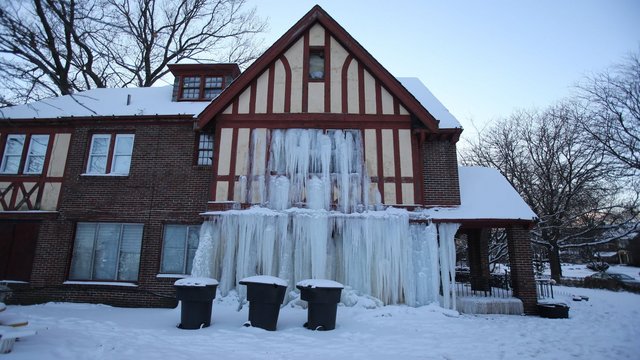 well-temperedforum.groupee.net
well-temperedforum.groupee.net  The Well-Tempered Forum
The Well-Tempered Forum  Off Key
Off Key  LAST QUESTION - Prepping for winter, avoiding freezing pipes
LAST QUESTION - Prepping for winter, avoiding freezing pipesGo  | New  | Find  | Notify  | Tools  | Reply  |  |
| (self-titled) semi-posting lurker Minor Deity |
Well we're in a different state and different house this year, and it's probably going to be a little colder (though not a lot apparently) than where we were living before, so I'm trying to get "ready" -- whatever that means! I'm googling around, but would be grateful from some WTF wisdom! 1. if we want to leave the water running over night, should we do it with more than one faucet? hot and cold taps? 2. if we travel during winter break, should we turn the water off to the house? (let's assume it will be 20F or colder over night) 3. If we turn off the water for more than a few days, do we also need to turn off the water heater? Is there anything we need to know about doing that? TIA!
| ||
|
| Beatification Candidate |
I think you get more problems with freezing rain and ice on sidewalks and streets than the nasty cold you might have experienced farther north. Pipes tend to freeze along outsize, underinsulated walls - and then only when it gets below zero. I don't think our family members that live close to you have ever had issues with freezing pipes.
| |||
|
| knitterati Beatification Candidate  |
If your house is heated, you should be mostly fine. Is there an inside shutoff for the outside water spigot? That’s the only thing we ever turn off. Oh, if you’re going to be away you could leave the cabinets open if the pipes are along the outside wall.
| |||
|
| czarina Has Achieved Nirvana  |
I know you are in a rental house... so, is there some particular reason you are thinking your pipes could freeze? In an insulated house with central heating, that should not happen. Turn off any outside spigots from inside the house and you should be fine. For extra insurance, leave the handle on the outside spigots fully open so that if any water is in there it can drain. I live where it gets to 40 below zero in the winter and I have never turned off my water to avoid freezing pipes, not even when gone for the month of February. I leave the thermostat set at 55.
| |||
|
| czarina Has Achieved Nirvana  |
Also, we never let the faucets run inside the house, no matter how cold it gets. I think the problems you had in SC were because you were in a milder climate, and the house wasn't designed for the unusual cold you got. Should not be an issue where you are now.
| |||
|
| knitterati Beatification Candidate  |
Oh, yes. My house is about 100 years old, and parts of it are not well insulated. So there’s that. If your house is more…normal, you shouldn’t have issues.
| |||
|
| (self-titled) semi-posting lurker Minor Deity |
Not especially, just good old fashioned paranoia. But, and to AdagioM’s point, our rental house was built in the 1990s and is probably pretty well-insulated. BTW I’ve been googling around and some pages say that, if you turn your water off for more than a few days, it’s recommended to turn off the water heater. Other pages say you don’t want to turn your water heater off because it could cause problems when you turn it back on.
| |||
|
| Has Achieved Nirvana |
A 1990’s house shouldn’t have a problem as long as you leave the heat on but ask your landlord for advice. Best practice is to leave the water heater on, even if turned down low, if you’re going to be gone. Expansion and contraction from cooling and reheating can cause them to leak. Don’t ask how I know this.
| |||
|
| (self-titled) semi-posting lurker Minor Deity |
Yikes! Guess we won’t be turning off the water heater then!! If we’re away I will ask the prop company for advice though. If the winter is mild, it probably won’t be an issue, but it’s too soon to say for that!
| |||
|
| Has Achieved Nirvana |
Good advice from everyone. We had a problem with freezing pipes in our 1960s house when the temps went below zero for several days in a row. But I'm talking record setting temps of -20F. The pipes are in what was an underinsulated wall. The shower curtains actually froze to the tub. Of course we had that dealt with and it's fine now. I'd be pretty surprised if you have any problem. A 1990s house will likely be much better insulated, and if there were any problems, the owners would have probably dealt with it as we did after the first frozen pipe incident. That said, you can always open cabinet doors under any sink. And don't set the thermostat too low in the house when you're gone. For the belt and suspenders crowd...If you're worried about the furnace going out, you can buy a remote temperature monitor that you can check on your phone to be sure that your furnace hasn't decided to hiccup while you're away. I can remember one time when we came back from Door County after a midwinter trip and found our Chicago house at 40 degrees. The furnace was fine and the power was on, but the batteries in the thermostat had died, so the furnace wouldn't run. At that time there wasn't any cheap and easy DIY technology to monitor remotely, but now there is. And it's portable so you can take it with you when you buy your own home. We don't have shutoffs for one of our outside faucets because it's a freeze-proof sillcock, where the valve is inside a heated area. We just have to be sure the hoses are disconnected from the outside. Our other outside faucet was re-routed when we put a screen room on the back of the house. Where it exits the structure can get cold enough to freeze, so we have a shutoff and actually drain to a bucket in the basement, but that's an unusual set-up. As Steve said, you can check with the property manager to see if there's anything special you need to do there to winterize.
| |||
|
| Has Achieved Nirvana |
Interesting. I didn't know that. We always turned off the power to our electric water heater in the vacation home and we never had a leak. The original water heater lasted 25 years, when we decided to replace it because it was old and not because it had started to leak. Guess we got lucky! We also used to shut off the well pump so that, on the outside chance a pipe froze because the furnace failed, at least we wouldn't keep pumping water into an ice cold house. 
| |||
|
| (self-titled) semi-posting lurker Minor Deity |
wtg Another question re water heater... so if we did want to turn the water off, would it be ok to do that but leave the water heater on? Obviously, if you turned the water off and left a tap open, the water heater would eventually get completely empty, so you wouldn't want to leave a tap open, right? I read some where that if you turn the water off to prevent pipes freezing, you should leave a tap open, hence this question. (Though that was advice related to just over night.) So you could turn the water main off but leave the water heater on. Would the water just sit in the water heater tank or would there be a loss of water pressure or something?
| |||
|
| Has Achieved Nirvana |
Edit: If you use water pressure and gravity as your guiding principles, I think you get the answers to a lot of your questions. A cautionary note about shutting off the city water (assuming that's what you have)...In our vacation home, shutting off the water involved turning off the breaker for the well pump, so that it was no longer pumping water into the house. That's different from an arrangement where you're getting municipal water and have a shutoff valve. The valve that shuts off the water from the city is one that doesn't often get used. Depending on the kind of shutoff valve that's there, it may decide to start leaking or fail when it starts getting used after years of being in one position. As Steve said, don't ask me how I know this.
| |||
|
| Has Achieved Nirvana |
And since you're generally asking about prepping for winter and for being away...If there isn't one of those fancy schmancy automatic shutoff thingys on the water supply to the washer, burst washer hoses are another potential hazard in any season. Are the hoses on the washer braided stainless, or rubber?
| |||
|
| czarina Has Achieved Nirvana  |
Never thought of this. Smart!
| |||
|
| Powered by Social Strata | Page 1 2 3 4 5 6 7 |
| Please Wait. Your request is being processed... |
|
 well-temperedforum.groupee.net
well-temperedforum.groupee.net  The Well-Tempered Forum
The Well-Tempered Forum  Off Key
Off Key  LAST QUESTION - Prepping for winter, avoiding freezing pipes
LAST QUESTION - Prepping for winter, avoiding freezing pipes